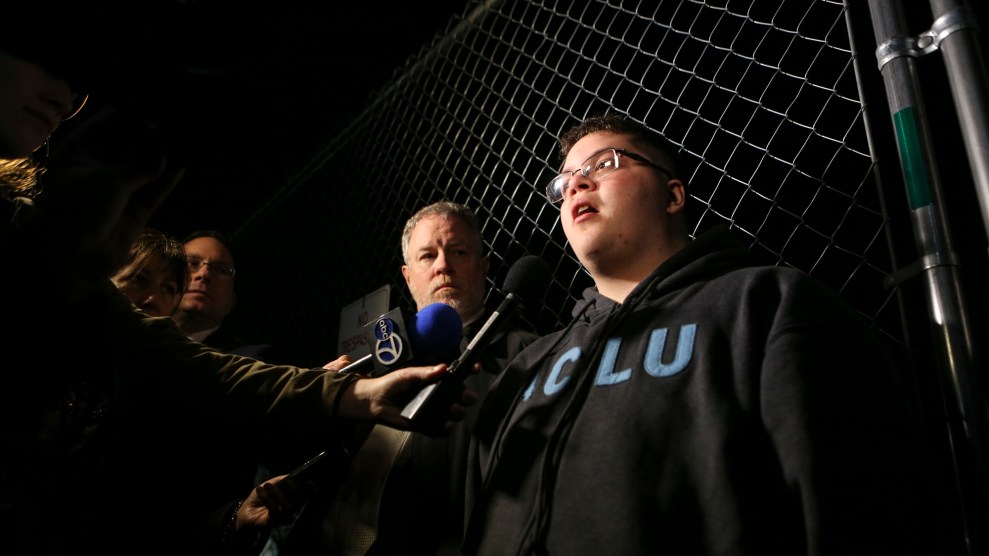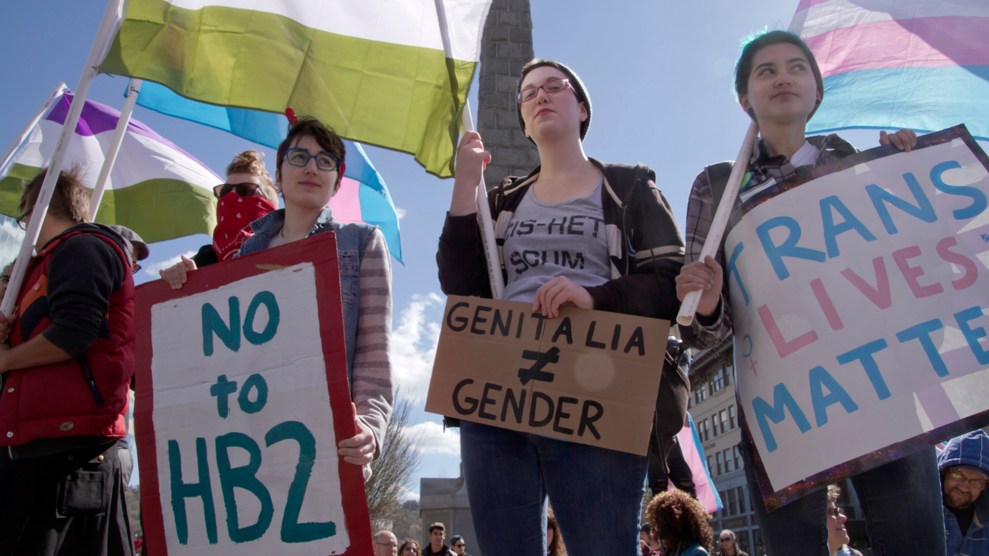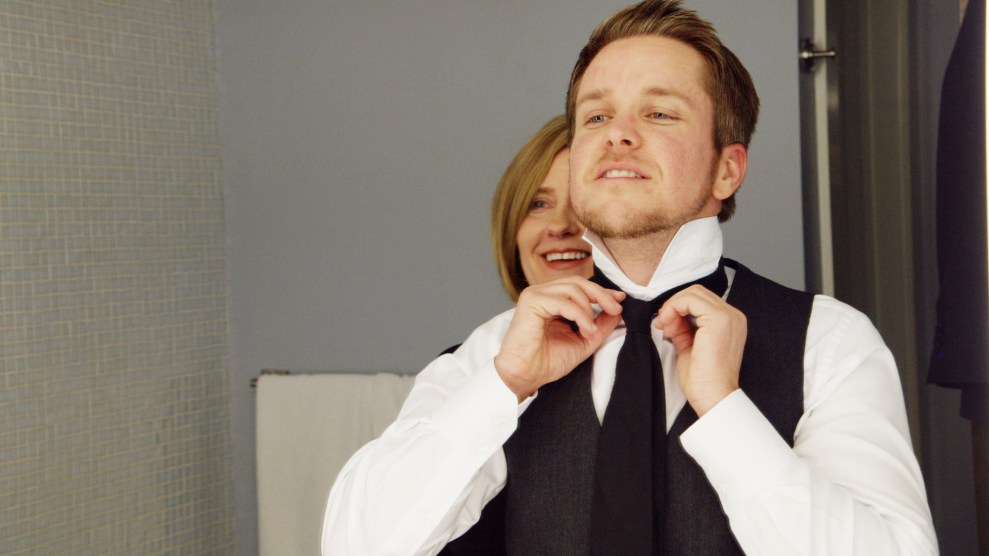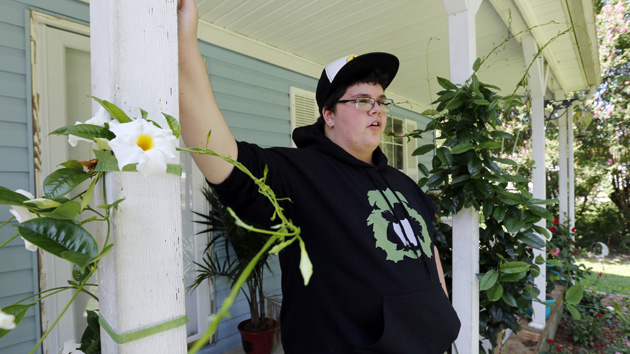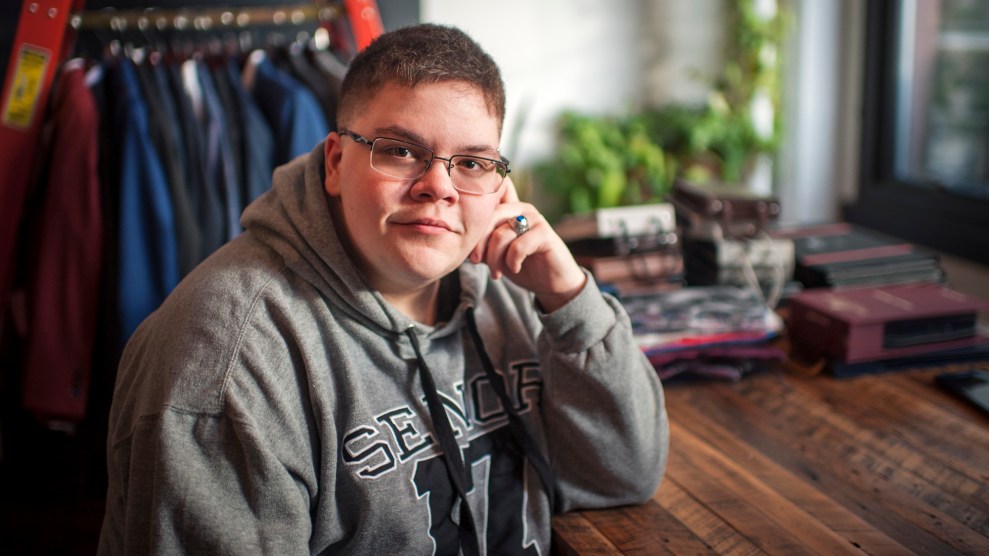
Gavin Grimm at Bindle & Keep, a tailor shop in Brooklyn, in FebruaryScout Tufankjian/ACLU
Update, May 22, 2018: After a yearslong fight, Gavin Grimm scored a victory today in Virginia. A federal court denied the school board’s motion to dismiss his case, ruling that federal law and the Constitution protect the transgender teenager’s right to use the school bathroom that matches his gender identity. The judge ordered Grimm and the school board to schedule a settlement within 30 days. “I feel an incredible sense of relief,” said Grimm. “I was determined not to give up because I didn’t want any other student to have to suffer the same experience that I had to go through.” Below is a conversation I had with Grimm last year after a major setback, when the Supreme Court declined to take his case.
Early on a Sunday morning last month, I rode with Gavin Grimm, a transgender teen from Virginia, in the back of a New York taxi to Bindle & Keep tailor shop in Brooklyn. There, the 17-year-old high school senior would shed his baggy jeans and a gray hoodie for a new suit, which he planned to wear to the Supreme Court hearing of his landmark case on transgender rights.
Looking out the window at the passing skyscrapers, Grimm remarked that he prefers big cities to his hometown in Virginia. Going to school in rural Gloucester can be a nightmare, he tells me: Because he’s transgender, he’s not allowed to use the boys’ bathroom, so he has to walk to a private room near the nurse’s office anytime he needs to pee. Grimm sued his school board in 2015, saying the policy violated federal civil rights law by discriminating against him on the basis of gender identity. His case made it all the way to the Supreme Court, which has never before considered questions about transgender rights.
In an amicus brief for Grimm’s case, parents wrote about how their trans children have been humiliated and stigmatized as a result of such policies at other schools. The issue isn’t just about bathrooms, Grimm and his lawyers argue, but about the right to exist in public space. Without access to bathrooms, it’s hard to sit through class, run errands, or hold a job.
At the tailor shop, about a month before the scheduled Supreme Court hearing, Grimm’s mother, Deirdre, noted that the dark suit made her son seem more confidant. “Now if we can just win,” she said through tears, after thanking the tailors for their help. “For all these kids and all these other moms.”
But Grimm won’t get a chance to wear the suit this month: On Monday, the Supreme Court announced that it would no longer hear the case. After the Trump administration gave schools across the country permission to block trans kids from bathrooms of their choice, the justices are sending it back to a lower court. It could be years before the high court takes up the question again. I caught up with Grimm at the tailor shop and again this week to hear what it’s like going to school in Virginia and how he’s taking the news from the Supreme Court.
Mother Jones: What’s your town like, and what about your high school?
Gavin Grimm: The school is not tiny, but that’s because it’s the only one in the county. It’s got a country-conservative vibe, teachers and students alike, but there are plenty of more open-minded students. [Gloucester] is more intensely conservative. You would not believe the amount of Trump signs I saw.
MJ: What do you do for fun?
GG: I pet my cat probably too much, and I dote over the [pet] pig probably too much, and then I just hang out with my friends. We hang out at someone’s house or we go see a movie. We go to Walmart. That’s the only thing to do around here.
MJ: When did you realize you were transgender?
GG: That’s kind of a hard question, because it boils down to vocabulary. When was I first aware of the word? When I was like 12. When did I feel like I was a boy? I was like two. It was something that was more abstract to me as a kid. I have a twin brother, and I was like, “On some level I feel like we are identical in our presentation, and like I’m no different from him.” As a little kid I was allowed to just harass snakes and play with bugs and play with dirt, whatever—I was just kind of allowed to be. But then the social aspects came in, like my dad would treat me like a girl, in a very old-fashioned way, which infuriated me. I didn’t want to be called a princess or anything like that.
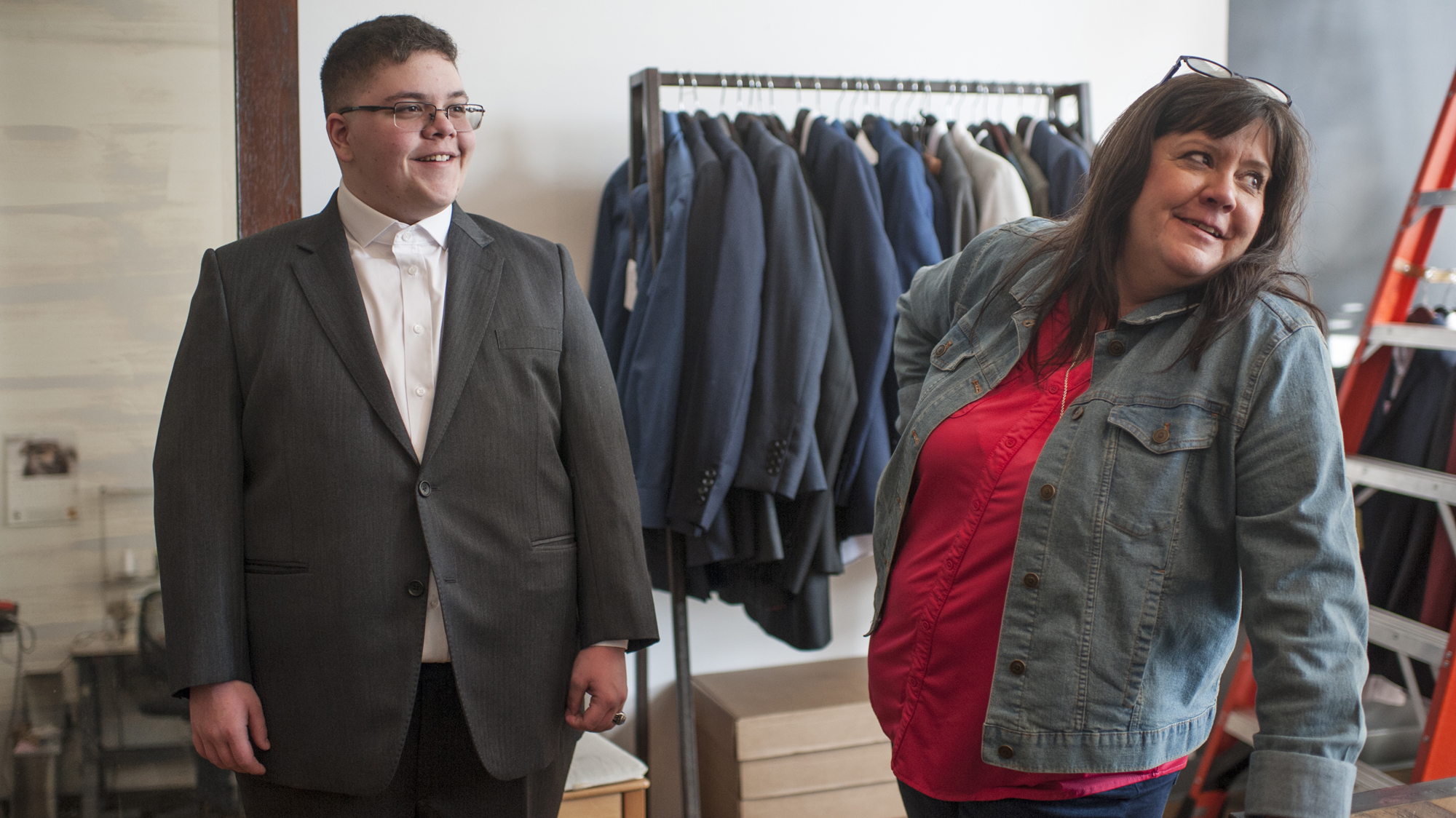
MJ: I heard you were shy when you were younger, though I totally don’t get that vibe from you now. Has it been hard having a lot of attention on you because of the case?
GG: I was shy because I was bullied horrendously and I didn’t really have any friends, so I was extremely insecure. I was really, really anxious all the time, and so interacting with people was extremely challenging for me, even people I knew, like family members. But once I transitioned and I was able to be myself, that radically changed. And as far as the attention, regardless of where I am now with my gregariousness, I am still not the kind of person that’s like, “Oh all the attention on me, yay, that’s fun!” This has been really hard to adjust to.
MJ: Not being able to use the boys’ bathroom—how does that affect you?
GG: Well day to day, there’s a practicality issue. I have to go to the nurse’s room, which is farther away from my classes than any of the actual restrooms, so I have to take a ridiculous amount of class time. Not like eight hours, of course, but compared to the three minutes that it would take [to use the boys’ room], it’s unacceptable. And it’s just very stigmatizing, and it’s embarrassing. If I ever stay after school or go to any sporting function, where the only bathrooms are the ones outside, I don’t have anywhere to go. Like I have to leave the campus to go to the bathroom.
MJ: Some people say you should just use the girls’ bathroom. Why can’t you?
GG: I really would like to sit down with someone who thinks it’s appropriate for me to be in the girls’ room and talk through that with them. Like I don’t think anyone wants me in there to begin with. It’s funny because people say I’m definitely not allowed in the boys’ room because I’m “a girl.” But then no one wants me in the girls’ room either.
I can’t go to the girls’ room because I’m not a girl. It starts and ends there. It’s a real simple concept.
MJ: Have other kids at the school been supportive of you?
GG: Some people treat me with this distance, or this “ew,” or they’ll like whisper around me or whatever. Some people, like people I used to talk to and stuff, they don’t speak to me anymore, but they’re not necessarily malicious. And then there are people who are like, “Hey, go you, you’re great.” So it’s a really mixed bag.
MJ: What’s your favorite part about school?
GG: Going home. I don’t enjoy any aspect of school. Like I’m a very social person, but that climate is so uncomfortable for me, and I also don’t have a friggin bathroom there, so that’s a problem. I guess if I had to choose, I enjoy the moment in the morning before the bell rings where I just get to hang out with all my friends.
MJ: I heard you talking in the taxi about genetics. Do you have an interest in that for your career?
GG: I love science. What I would really like to do one day is start my own practice where I do family planning through genetics. A lot of people, if they have a devastating condition, they don’t want to pass it on. I’d give people consultations about what might be best for their future, gene-wise.
MJ: Some people have called you a hero for the transgender community. Who are your heroes, or who do you look up to?
GG: I do have heroes, but then I always blank on this one. One person I can think of off the top of my head is Ellen DeGeneres. With me and my mom, it’s kind of a family affair to watch her. Her love and care and just selflessness has always been so inspirational to me.
MJ: Since you’re a senior now, you might graduate before you get a resolution in your case. Does that mean it won’t affect you?
GG: I have some underclassmen friends, and if I were to ever go back to a football game or go to a function or whatever, I would still be barred from the restroom, so it does affect me in that way. But you’re right in saying it primarily is not going to affect me. So my focus right now is on my trans friends that still go to that school or just anyone who might come after me that’s trans going to that school, or any other school.
MJ: Where were you when you found out the Supreme Court was kicking your case back to the lower court?
GG: I was in class. I was very disappointed, of course, that this was not going to be over as soon as I had hoped. Not only will it take a bigger chunk of time out of my life, but also, more importantly, the kids that are stuck in limbo in the meantime—I’m so upset that that part of it will drag on even longer. But I mean, that’s just how the cookie crumbles. So rather than focusing on what I can’t control, I just set my sights on what I can control, and that’s what I do going forward.
MJ: Have lots of people been reaching out to you to thank you for standing up in this cause or tell you their story?
GG: Hundreds of people. I’ve had so many narratives shared with me, from people who say, “You help me understand my child,” to people who say, “I’m an educator and you help me support my students.” It’s been so beautiful that people feel safe to share those with me. I love hearing it every time.
MJ: You protested outside the White House last month after the Trump administration rescinded the Obama-era guidance protecting trans kids in schools. Can you describe what that night of protest was like? What was your main message for Trump?
GG: You know, it was really surreal. When I was younger, I was politically active—just in my day-to-day life, I tried to stay as informed as possible. I always sort of thought that when I was an adult I’d participate in things like that, but I never, ever thought I’d be participating in something central to myself. I thought I’d be standing beside other people for a common cause but never thought I’d be that common cause, and my rights and the rights of trans youth would be that common cause. So it was absolutely breathtaking and surreal and just totally, totally humbling. It really showed me how much love and support I have, to a more tangible degree.
And then to your second question, I don’t really have a message directly to the administration. My goal is to promote positivity, and I think rather than address that head on, I’d like to voice a message of support and encouragement to the trans youth out there who are feeling scared and lost and alone and angry and sad: You know, this isn’t the end of the road, there are still people fighting for them. This case isn’t over, it hasn’t gone away. Regardless of what happens with this case specifically, in the end equality will absolutely prevail, absolutely. I believe that with every fiber of my being. And I hope they can keep that in mind and try to find time to love themselves going forward.


